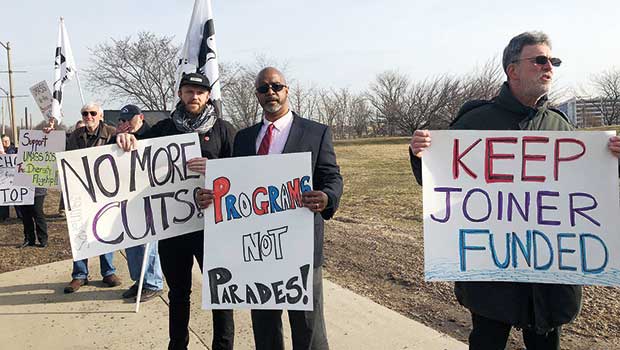Veterans protest UMass budget cuts
Joiner Institute forced to lay off staff

Following a period of financial turmoil at UMass Boston, war veterans, staff members and supporters of the William Joiner Institute for the Study of War and Social Consequences gathered last week at the Dorchester Vietnam War Memorial to protest the school’s decision to cut funding.

Author: RT TutkoThomas Kane, director of the Joiner Institute, addresses staff members and supporters at the Vietnam Veterans Day demonstration.
On National Vietnam War Veterans Day, March 29, the demonstrators said that within the last year, the institute has had to lay off all of its full-time staff members and cut programs such as the Veterans Upward Bound Program, which helped veterans matriculate from service into higher education.
The cuts are part of a school-wide crisis of staff layoffs, program cancellations and increased tuition rates to offset UMass Boston’s $30 million budget deficit, linked to campus construction projects.
“What the university did to us totally devastated, demoralized and devalued us,” said Thomas Kane, director of the Joiner Institute.
According to Mitch Manning, program coordinator for the institute, the school cut the center’s funding by nearly $300,000 in fiscal year 2017.
The Joiner Institute has specialized in research, education, advocacy and outreach since 1982, when it was created and named after black Vietnam War veteran William Joiner. It provides veteran support on campus and in the Greater Boston community for former combat soldiers suffering from post traumatic stress disorder, substance abuse and brain injuries.
The center has also been the epicenter of peaceful relations between the U.S. and other countries previously at war with the U.S., including Vietnam and Iraq.
“We have a 30-year relationship with the country of Vietnam,” said Manning. “This was a big part of the Joiner Institute when they were founded in 1982. The Joiner was doing exchanges with Vietnam while there was still an embargo between the two countries.”
“Our impact is global,” said Kane. “The work we do here is vital to veterans and their families and to civilian victims and refugees of war.”
Self-sufficiency
Late last month, Barry Mills, UMass Boston interim chancellor, published a statement outlining the $1.5 million in funding cuts to the school’s 17 centers and institutions, including the Joiner Institute. Other centers losing funds include the William Monroe Trotter Institute for the Study of Black Culture, the Mauricio Gastón Institute for Latino Community Development and Public Policy, the Center for Women in Politics and Public Policy, the Institute for New England Native American Studies, the Labor Resource Center, and the Center for Social Policy.
In his statement, Mills said the cuts were a way to decrease the school’s budget deficit as well as help the centers reach financial independence by encouraging staff to instead seek funding from private donors and grants.
“My hope is that the centers and institutes affected, like other centers and institutes at UMass Boston and around the nation, will replace the funds they are losing in the short term and become self-sufficient,” the statement reads.
In addition, the statement reads, “Every dollar not spent subsidizing the operations of a center or institute is a dollar saved — or available for use in our financial aid or academic programs.”
Kevin Bowen, former director of the Joiner Institute, spoke at the Vietnam Veterans Day demonstration and addressed the chancellor’s statement. “The chancellor released the memo which pitted funding for the Joiner Center against funding for student financial aid and the academic mission of the university,” he said expressing disapproval. “And he suggested that our subsidy might actually be responsible for student debt.”
The staff at the Joiner Center said that the budget cuts will impact their annual writer’s workshop; their high school teachers workshop, titled “Humanizing How We Teach about War and Violent Conflict”; music therapy programs for veterans; research into the health effects of war; cultural exchanges; speaker series; and translation projects.
“There is no place like this in the country,” said Bowen.
William Joiner’s son, also named Bill Joiner, attended the protest demonstration and talked about his father’s work in helping former soldiers adjust to civilian life after witnessing the horrors of war.
“The decision to defund the center is really indicative of the short-sightedness many people have when they send the best and the brightest off to war … and try to wash their hands of any effects of the war,” he said.






